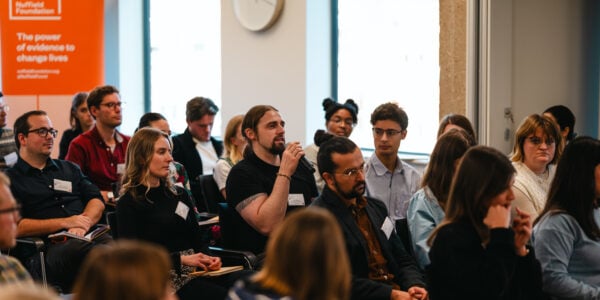
28/06/17
4 min read
The Nuffield Foundation will award an additional £20 million for funding research and development projects over the next five years, bringing its anticipated expenditure for the period 2017-2022 to at least £70 million.
The £20 million is additional to the Foundation’s annual expenditure of £10 million, and will be used to fund large scale, longer-term projects that align with the Foundation’s new five-year strategy published today.
A new programme of Nuffield Foundation Fellowships will give space and time to those with an informed interest in the Foundation’s agenda to access its research networks and consider significant social issues and policy in more depth.
As part of a new focus on the implications of a data-enabled society, the Nuffield Foundation is developing plans in partnership with the Royal Society, British Academy, Royal Statistical Society and Alan Turing Institute, to establish an independent Convention on Data Ethics. This deliberative body will bring together academics, policy makers and public and private sector interests to improve public understanding and to explore solutions for fairer and safer data-use arising from technological innovation, regulation, or changes in public behaviour.
Education, Welfare, Justice
The Nuffield Foundation funds research, analysis, and student programmes that advance educational opportunity and social well-being across the UK. The new strategy sets out the Foundation’s funding priorities following a review of how it can best interpret its original objectives in light of the rapid social, demographic, technological and economic changes in UK society.
The Foundation will fund research and analysis that improves the design and operation of social policy through better understanding of the issues affecting people’s chances in life, focussing on three core domains of Education, Welfare, and Justice. It will also fund work that cuts across these domains, in particular the impact on people’s lives of digital technologies, social inclusion between and across generations, the significance of social geography in an increasingly diverse society and the impact of physical and mental disability and chronic illness.
Equipping young people with the skills to participate in a knowledge economy
Building on the success of its programmes that provide opportunities for individual students – Q-Step and Nuffield Research Placements – the Foundation will develop new ways to equip young people with skills and confidence in scientific and quantitative methods by expanding its student programmes to other disciplines and younger age groups.
Strategic Goals
Over the next five years, the Nuffield Foundation’s work will be led by four strategic goals: Specifically, it sets four key strategic goals:
- Bring together researchers and users of research to identify the larger questions in the Foundation’s core areas of Education, Welfare, and Justice, and fund research that advances educational opportunity and social well-being.
- Focus on the broader implications of a digital society and improve the accessibility, use, and collection of the evidence and data necessary to understand the issues affecting people’s life chances.
- Expand the Foundation’s student programmes to increase opportunities for young people – particularly those from disadvantaged backgrounds – by giving them the skills to be active participants in a knowledge economy.
- Act as a convening space to enhance the profile and influence of the Foundation’s research portfolio and use its independence to encourage academics to frame original questions with the potential to change the terms of public debate.
The Foundation will also take a more prominent role in promoting its research output as a whole, expanding its events and publications programmes, in order to increase the collective impact of the projects its funds.
Tim Gardam, the Foundation’s Chief Executive said:
“The Nuffield Foundation’s mission has always been to advance social well-being and educational opportunity. Our primary objective is to improve people’s lives through better understanding of the issues affecting their life chances. We need to engage with, and to understand better the significance of new trends and disruptive forces – social, demographic, technological and economic – that are changing the structures and context of people’s lives.
“We want the research we fund to influence public policy and how it works in practice, to help secure social inclusion and the skills necessary to succeed in in a digital economy, and to safeguard, through the justice system, the rights of the individual in relation to the State.
“Our strength lies in our financial and intellectual independence, and in our commitment to evidence and rigorous analysis which connects the perspectives of academics, policymakers and those working in professional practice. This independence gives us the freedom to step back and identify the larger questions in social policy, particularly in our core areas of Education, Welfare, and Justice. At a time when public trust in evidence it increasingly called into question, we also have a responsibility to demonstrate how the research we fund is relevant to people’s daily experiences.”
Convention on Data Ethics
The Nuffield Foundation is considering how it can complement any formal stewardship body as recommended by the Royal Society and British Academy Joint Data Governance Working Group Report, Data Management and Use: Governance in the 21st Century, also published today. The Foundation shares the report’s assessment that concepts that are core to public confidence in governance are becoming increasingly contested; and that the meanings in policy, law and public discourse of notions such as privacy, consent and ownership have changed and will continue to change.
The Foundation hopes to work in partnership with the British Academy, Royal Society, Alan Turing Institute and the Royal Statistical Society, along with other potential funders and stakeholders, in undertaking the necessary groundwork to launch an independent Convention on Data Ethics in 2018. The Convention would connect the work of data scientists and academics from other disciplines to public policy and to practitioners and decision-makers in the public and private sectors. By creating an independent convening space, the Convention would identify the key issues, deliberate on how these might be addressed, and propose areas for research that would progress the debate.
Guide for applicants
We have revised our funding priorities to align with our new strategy. These are detailed in our revised Guide for applicants, along with full details about how to apply.

















































